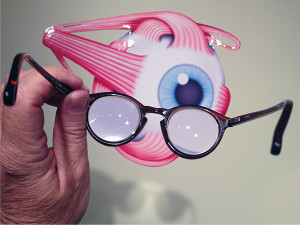What is better for your eyes, glasses or contacts? As teachers of vision improvement you may find it odd that we would encourage the use of either glasses or contacts. However, one of the two can actually be used to help improve vision and assist you in the eye exercises; whereas the other can slow your progress. In this podcast we also share an overall pros and cons list for glasses and contacts to help you decide which is better for you and your eyes.
 Glasses vs Contacts – General
Glasses vs Contacts – General
Below is a general list of of both positives and negatives:
Contacts Benefits
- For those who are self conscious about how they look in glasses contacts obviously allow you to not wear glasses frames so no one will know you need corrective lenses.
- Contacts allow you to have a full view of your vision without any obstruction in the periphery which inhibits your full visual range.
Contacts Negatives
- Constantly touching the eyes to put contacts in increases the risk of infection.
- Although technology is greatly improving the quality and permeability of the contact lens material, it still reduces the amount of oxygen and nourishment that can reach the front of the eye. Those who have fallen asleep wearing contacts and have woken up the next day with red, dry, itchy eyes know exactly what we are talking about!
- Despite many people’s best efforts, both contact lenses and contact lens cases can be very hard to keep clean and are prime breeding grounds for fungus and bacteria.
- Contacts can be more expensive than glasses .
Glasses Benefits
- Glasses are generally cheaper than contacts.
- They greatly reduce the risk of eye infections.
- Allow oxygen and nutrients to fully access the front of the eye.
Glasses Negatives
- The lenses often get dirty or scratched and this can go unnoticed for hours or even days obscuring clear vision.
- Frames can be too tight for the head and ears creating headaches and soreness.
- The lens of a contact is against the front surface of the eye and so you have full access to the periphery. However, with glasses the lens does not cover your outer periphery. The arms of the frame can also obstruct your field of vision.
Glasses vs Contacts – Vision improvement perspective
You can see from the general list of pros and cons that although contacts can make seeing easier, the overall health and wellness of the eye is at greater risk. There are also other benefits to wearing glasses that can help with your natural vision improvement and eye exercise program.
- Eye exercise are best done without any prescription lenses. Unlike contacts, glasses can easily be taken off so you can perform your eye exercises anytime of the day.
- Progressive lenses and mono-vision lenses are becoming increasingly popular as a way of seeing clearly both near and far, but they can have a negative effect on both the brain and the eyes. With glasses you can have one pair for seeing near and the other for seeing far eliminating the need for a progressive or mono-vision prescription.
- Glasses are cheaper and easier to replace. This means you can start reducing the prescription of your glasses to assist you in vision improvement. It also means that, as you start improving your eyesight through the eye exercises, it is easier and cheaper for you to buy new lower prescription glasses!
Glasses vs Contacts Summary
Although contacts can seem less of an inconvenience on a day to day basis, from a natural vision improvement perspective glasses have more health benefits and make the vision improvement process a lot easier. Glasses allow you to easily remove your corrective lenses to perform the eye exercises. They are also a lot cheaper and easier to replace when you start improving your eyesight.


Hi whats your opinion on orthokeratology? Thanks.
Hi, we agree with it in conjunction with eye exercises in the case of Keratoconus.
So not in the case of myopia? Thanks so much.
Would you recommend orthokeratology on kids with high myopia.
We do, but in conjunction with the exercises.
I’ve worn contacts (to see far away) every day for over two decades. I’m starting to notice blurriness when reading while I’m wearing contacts now, especially in low-light when I’m tired. I’m thankful that I see amazingly well up-close for reading, etc. without contacts no matter the light or my rest level. I’m going to do your program because I’d LOVE to have perfect vision sans contacts. (Thank you!!!) Meanwhile though, could you offer your perspective on why this new blurriness might be happening?
It’s cool that you point out that contact lenses give you better peripheral vision than glasses. I started playing tennis on the weekends recently, so I’m considering going to an optometrist to get fitted for contacts soon. I’m going to search for a reputable optometrist in my area that does contact lens fittings.
Great! Ideally somone who would be ok slightly reducing the prescription from time to time. This way you help your eyes grow stronger as you play (as long as you’re not straining your eyes). I had a client last week with -3 Myopia play a whole 2 hours without any assited optics after taking my 8 week program clearer vision program and although not perfect he held his own!:-)